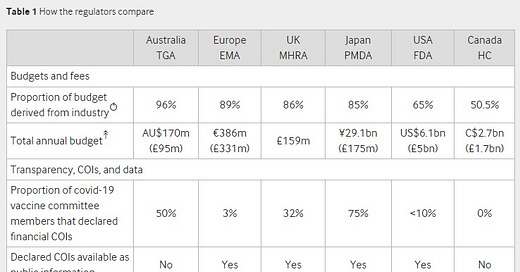Regulatory Capture - what is it?
And how can we stop our institutions and agencies from being so corrupted?
[sharing my post (now updated) from the We Accuse Blog]
There are still too many people I speak to, academics included, who seem to have no idea of the extent of the global regulatory capture. Worse yet, (and I admit I was in this category until a few years ago), Joe Public may not even know what the phrase ‘regulatory capture’ actually means, in practical terms. So, let’s begin this short article with a definition from BC (Before Covid):
The concept of regulatory capture, according to a book by Professors Carpenter and Moss: Preventing regulatory Capture: special interest influence and how to limit it published in 2014, (ironically by Cambridge University Press) is:
the result or process by which regulation, in law or application, is consistently or repeatedly directed away from the public interest and toward the interests of the regulated industry, by the intent and action of the industry itself.
The issue of what constitutes ‘public interest’, or more broadly, ‘a public good’, has been a topic of controversy for decades. (See for example, Sue Baker’s excellent work in this area with regard to Charity Law and tax exemption). But the common sense approach to the way that public interests can be (and have been) deliberately overruled, in favour of profitable commercial gain, is the subject that should be front of mind. How can we trust any entity which claims to be independent, to provide us with unbiased information, when that entity is almost entirely funded by the very industries it is tasked with protecting the public from? Not only that, but how can we trust them, when the senior leadership of these entities are simultaneously employed and/or profiting (profiteering?) from those industries?
The truth is, as Dr Aseem Malhotra (and others) point out, these entities have become ‘enablers’ of those industries, NOT restrictors or regulators. And that word has even been used by Governments themselves.
In an article in the BMJ last year, the author illustrated how “Industry money saturates the globe’s leading regulators. The BMJ found that the majority of regulators’ budget—particularly the portion focused on drugs—is derived from industry fees.” This table within that article, summarising the BMJs investigations, presents the stark realities of regulatory capture of our healthcare systems around the world:
But at what point does regulatory capture become plain old corruption? The term regulatory capture was first used in the 1950s and of course technological advancements, social media, not to mention AI like ChatGPT has fundamentally changed how entities can be captured, and the public unwittingly become victims of PR machinery’s behavioural science strategies, like those set out in the UK Government’s Mindspace report. Otherwise known as the 'Nudge Unit'.
[Image Credit: C Yang on Unsplash]
We’ve known for years that academia has been captured through the slow creep of policies intrinsic to New Public Management: surveillance, marketisation, globalisation and KPIs that prioritise artificially-created ‘measurables’ at the expense of generating authentic knowledge and facilitating learning for learnings’ sake. But many people may not be aware of the mechanisms of that capture – such as suppression clauses in research grant applications, which legally prevent academics from publishing outcomes that may be contrary to the political narrative (i.e. the funder’s objectives). And it is those ‘Research Administration’ departments, often a source of frustration for academics keen to progress with meaningful work, which control this level of funding bureaucracy. You can understand, for instance, why a certain company may not want marketing information getting out that may harm their profits, likewise a political group or NGO won't want any negative impact on a Governmental election if they are supportive of a specific policy/candidate.
One wonders who and how many academics were captured, in the making of the Covid Psyops strategies in the media and elsewhere, which were used against citizens, to ‘nudge’ them (an innocuous term that doesn’t really explain the evil intent). Strategies that came straight from that Mindspace report linked to above, as explained so clearly in this 10 min Video from Panda.
Universities – especially now that profitable international students are few and far between – are heavily reliant upon research funding, for their financial sustainability and their international (fake) reputations. Along with being heavily controlled, sometimes the censorship reaches new levels as these research funding grant contracts have no-cause termination clauses, meaning that, presumably, unless the researchers toe the line, they could have that metaphorical rug pulled out from under them at any moment, and be left without a job and without the ’kudos’ of their academic professional identity.
Needless to say, many academics have been down this road and some have chosen the route of ethical standards. They may have paid a high price personally and professionally, for holding the line. But meanwhile, in the high staff-turnover environment of zero-hours academic contracts, there are plenty more ‘early career’ researchers who either do not (want to) see the exploitation, or who simply accept that they must sacrifice their ethical standards to achieve that ever-elusive professorship. Wise Eugyppius recently published an excellent article about this matter.
In my PhD research, published five years ago, lecturers who complied with obviously meaningless auditing requirements referred to this kind of behaviour as ‘jumping through hoops’. But it has taken on a far more sinister nature, especially for healthcare professionals facing life and death dilemmas. Why have governments been allowed to subvert the work of universities in this way and convert them into cost-centres and marketing machines? These factors and more are described in great detail in John Smyth’s book “Toxic University” (2017).
[Image credit: Mark Duffel, Unsplash]
Recently, Andrew Bridgen MP stated he was offered “whatever he wanted” by the UK Prime Minister’s Office, if he would just stop talking about his vaccine injured constituents. He won't. Nor will many others. He is currently apparently talking with legal advisors, but clearly, many governments are out of control with the power they have wielded over the last three years, and think they can continue to control the narrative, indefinitely. They can’t.
Latest pseudo-revelations in The Telegraph may indicate that these ‘leaders’ perceptions of unaccountability, are finally coming to an end. And what these corrupted authorities don’t count on, is authentic humanity – the grass-roots honesty of the public who have realised that money and positions of power are not the solution to our problems. Instead, we must continue to develop parallel structures, and these new communities will need to be highly resilient to any risks of commercial capture. How can we build this into our future? Is revolution inevitable?
What can you do to take action? Educate yourself about regulatory capture. Firstly - who is captured in your country and how? Then raise awareness of this regulatory capture with others in your network – the more people who know, the more they question. We need people to become their own critical thinkers.







The parallel structures will only start as parallel. They will be the ONLY structures soon enough!
Spot on, regulatory capture is almost complete in the western "democracies". Banks and corporations just help themselves to the taxpayers hard earned cash whenever they want. Politicians are paid ten times as much by the corporations in speaking fees and consulting fees than they earn in their wagepackets so they have no incentive to work for us anymore. Political capture is also now complete. We have also now learnt media capture is also complete, the mainstream are now the propoganda arm of the pharma military complex. I am thinking about emigrating soon!